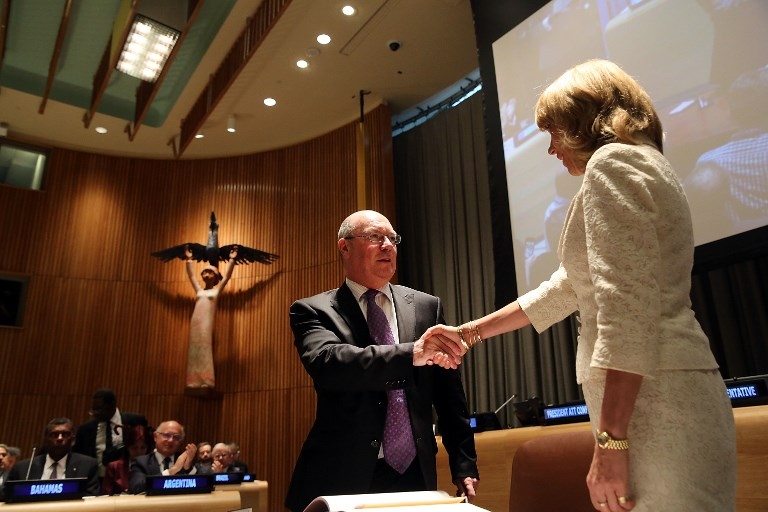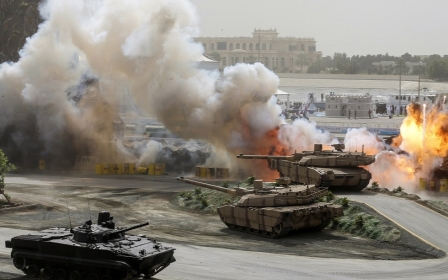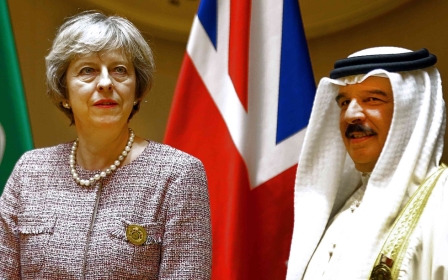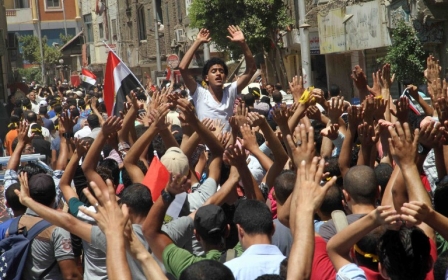'Stand up to dictators': Rights group urges new UK foreign office team

Rights groups have called on the British government to "stand up to dictators" in the Middle East as the prime minister, Theresa May, announced a shakeup at the foreign and international development offices.
Rory Stewart, a former deputy governor of a province in Iraq after the invasion in 2003, has been made minister of state for the Department for International Development, while Mark Field was made minister of state for the Foreign and Commonwealth Office.
Tobias Ellwood will continue at the foreign office as minister responsible for the Middle East, North Africa and Counter Terrorism, while Alan Duncan and Tariq Ahmad have both been appointed ministers in the foreign office.
Human rights campaign group Reprieve called on the team to "stand up to dictators, including so-called allies in Saudi Arabia and Bahrain, who execute protestors and juveniles".
Stand up to dictators, including so-called allies in Saudi Arabia and Bahrain, who execute protestors and juveniles
- Reprieve
"Stop spending UK taxpayers' money on foreign police and criminal justice institutions involved in torture and the death penalty," the group said in a statement.
The former Middle East minister Alistair Burt will work across both departments but he has maintained links with some of the worst human rights offenders in the Middle East and has been a strong advocate for intervention in Syria.
According to parliament’s register of financial interests, Burt has been on expenses-paid trips to Bahrain, the UAE and Israel, since resigning as Middle East minister in 2013.
In a trip paid for by Bahrain’s foreign ministry last year, Burt attended the Manama Dialogue security conference in Bahrain, organised by the London-based and Bahrain-funded International Institute for Strategic Studies.
Also in attendance was former CIA chief General David Petraeus and the French defence minister, Jean-Yves Le Drian.
Burt also spoke at the 2013 conference where he was accompanied by the then foreign secretary, William Hague, and Nicholas Houghton, the chief of the defence staff. Bahrain’s parliament funded that trip also.
Bahrain has been condemned by rights groups for its poor human rights record where authorities have fired on unarmed protesters, administer torture and detain political opponents without charge.
Yet the UK government continues to sell arms to the Gulf monarchy and it was revealed earlier this year that British commandos were giving Bahrain troops smalls arms and sniper training.
In December Burt was in Israel for the Tripartite Australia Israel UK Leadership Dialogue conference.
His trip came a few weeks before the UN Security Council passed a resolution that Israeli settlements in Palestinian territory were illegal.
And last month, Burt was in the United Arab Emirates on a trip sponsored by the UAE's foreign minister and on behalf of the All Parliamentary Group on the UAE.
The purpose of the visit, according to parliament’s register of interests, was "to meet government ministers, members of the Federal National Council and senior business figures to build on the bilateral relationship and promote trade and investment ties".
Human Rights Watch accuses authorities in the UAE of a string of human rights abuses, including enforced disappearances and torture.
While foreign office minister, Burt was also a proponent of military intervention in Syria after the Ghouta chemical attack in 2013, and said the failure of then prime minister David Cameron to win parliamentary backing had created a "constitutional mess".
The new British team also faces calls for an investigation into British arms sales to members of the Saudi-led coalition fighting in Yemen.
Amnesty International has claimed that the British government may be "complicit" in war crimes after it found that Saudi Arabia had used British-made cluster munitions in the country.
'Limited bandwidth'
Chris Doyle, director of the Council for British-Arab Understanding (CAABU), welcomed Burt's appointment and said that he had showed "continued interest" in the region since leaving the foreign office in 2013.
Rory Stewart, he said, "knows the Middle East" and would bring "deep experience" on development issues which he gained from his time as a provisional deputy governor in Iraq.
But Doyle said that the department will be devoting so much of its resources towards Brexit that it would have "very limited bandwidth to kick off any new initiatives" in the Middle East.
He predicted that while Britain would remain involved in the war against the Islamic State group (IS), "I think we’ll remain on the margins of talk about Syria".
It would be in Britain’s best interests to ease tensions between Qatar and its neighbours and for the Iran deal to continue, he said.
On Israel-Palestine, he said, "there won’t be a huge, great effort" but rather there will be some "fire-fighting to make sure things don’t get worse".
He also said that the "lack of reliability" on the Trump administration would also make Britain’s role in the Middle East "much harder".
Foreign policy would be stifled, he added, because the government has failed to achieve a parliamentary majority and so ministers would be "navel-gazing" at the prospect that there could soon be another election.
"The concept of a global Britain will look paper thin in this environment."
Middle East Eye propose une couverture et une analyse indépendantes et incomparables du Moyen-Orient, de l’Afrique du Nord et d’autres régions du monde. Pour en savoir plus sur la reprise de ce contenu et les frais qui s’appliquent, veuillez remplir ce formulaire [en anglais]. Pour en savoir plus sur MEE, cliquez ici [en anglais].




